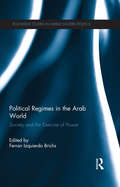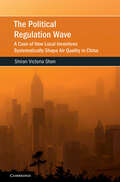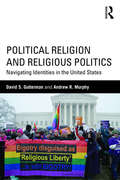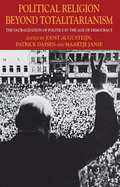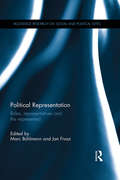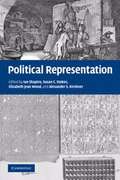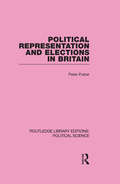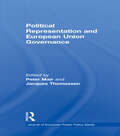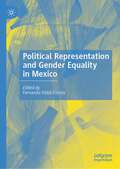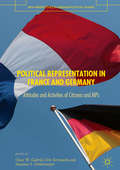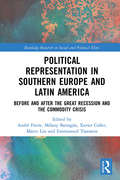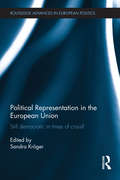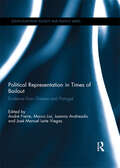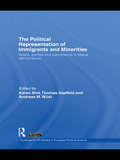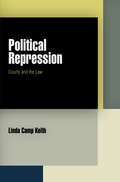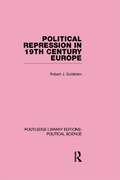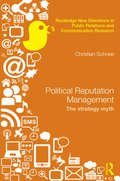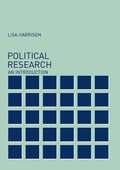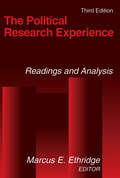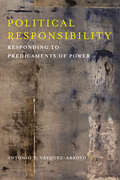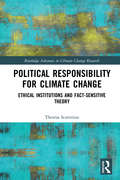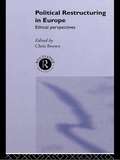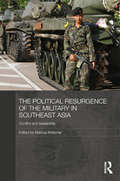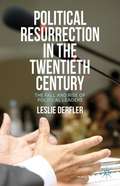- Table View
- List View
Political Regimes in the Arab World: Society and the Exercise of Power (Routledge Studies in Middle Eastern Politics)
by Ferran Izquierdo BrichsOne of the implications of Orientalism is that the Arab world, as a homogenous entity, is often analysed as an anomaly within the international system. This book argues that, despite their differences, societies across the globe ultimately construct their own history according to very similar dynamics and tensions. The methodological approach of this book, using different countries within the Arab world as models, offers the reader an analysis of relations between the elites and their opposition in a variety of settings. A definition of the political structure of each country is drawn from this analysis before potential future scenarios, as according to country specific experts, are proposed. This model provides a useful contribution to students and scholars of political science and international relations. Through providing a comparative study of the political regimes currently operating in the Arab world; their elites, civil society, power resources and political resistance, this book illustrates that despite the image of homogeneity sometimes portrayed by the Arab world, it is the multiplicity of models and heterogeneity of regimes that constitute reality.
The Political Regulation Wave: A Case of How Local Incentives Systematically Shape Air Quality in China (Cambridge Studies on Environment, Energy and Natural Resources Governance)
by Shiran Victoria ShenWhy has there been uneven success in reducing air pollution even in the same locality over time? This book offers an innovative theorization of how local political incentives can affect bureaucratic regulation. Using empirical evidence, it examines and compares the control of different air pollutants in China-an autocracy-and, to a lesser extent, Mexico-a democracy. Making use of new data, approaches, and techniques across political science, environmental sciences, and engineering, Shen reveals that local leaders and politicians are incentivized to cater to the policy preferences of their superiors or constituents, respectively, giving rise to varying levels of regulatory stringency during the leaders' tenures. Shen demonstrates that when ambiguity dilutes regulatory effectiveness, having the right incentives and enhanced monitoring is insufficient for successful policy implementation. Vividly explaining key phenomena through anecdotes and personal interviews, this book identifies new causes of air pollution and proposes timely solutions. This title is also available as Open Access on Cambridge Core.
Political Religion and Religious Politics: Navigating Identities in the United States (Routledge Series on Identity Politics)
by Andrew R. Murphy David S. GuttermanProfound demographic and cultural changes in American society over the last half century have unsettled conventional understandings of the relationship between religious and political identity. The "Protestant mainline" continues to shrink in numbers, as well as in cultural and political influence. The growing population of American Muslims seek both acceptance and a firmer footing within the nation’s cultural and political imagination. Debates over contraception, same-sex relationships, and "prosperity" preaching continue to roil the waters of American cultural politics. Perhaps most remarkably, the fastest-rising religious demographic in most public opinion surveys is "none," giving rise to a new demographic that Gutterman and Murphy name "Religious Independents." Even the evangelical movement, which powerfully re-entered American politics during the 1970s and 1980s and retains a strong foothold in the Republican Party, has undergone generational turnover and no longer represents a monolithic political bloc. Political Religion and Religious Politics:Navigating Identities in the United States explores the multifaceted implications of these developments by examining a series of contentious issues in contemporary American politics. Gutterman and Murphy take up the controversy over the "Ground Zero Mosque," the political and legal battles over the contraception mandate in the Affordable Health Care Act and the ensuing Supreme Court Hobby Lobby decision, the national response to the Great Recession and the rise in economic inequality, and battles over the public school curricula, seizing on these divisive challenges as opportunities to illuminate the changing role of religion in American public life. Placing the current moment into historical perspective, and reflecting on the possible future of religion, politics, and cultural conflict in the United States, Gutterman and Murphy explore the cultural and political dynamics of evolving notions of national and religious identity. They argue that questions of religion are questions of identity -- personal, social, and political identity -- and that they function in many of the same ways as race, sex, gender, and ethnicity in the construction of personal meaning, the fostering of solidarity with others, and the conflict they can occasion in the political arena.
Political Religion beyond Totalitarianism
by Joost Augusteijn Patrick Dassen Maartje JanseThe success of fascist and communist regimes has long been explained by their ability to turn political ideology into a type of religion. These innovative essays explore the notion that all forms of modern mass-politics, including democracies, need a form of sacralization to function.
Political Representation: Roles, representatives and the represented (Routledge Research on Social and Political Elites)
by Marc Bühlmann Jan FivazIn an ideal democracy, representatives would entirely reflect citizens’ views, preferences and wishes in their legislative work. However, real-life democracies do not meet this ideal and citizens’ policy preferences and priorities are mirrored only inadequately. This book provides new insights on political representation. It is guided by three questions: what roles should representatives play? Who is actually or should be represented? How are the representatives (or how should they be) connected with the represented? Containing contributions from the perspectives of political theory and philosophy, as well as quantitative empirical studies, the volume demonstrates the need to adapt these established questions to new political realities. This text will be of key interest to scholars and students of political representation and parties, political theory, democratic theory, political philosophy and comparative politics.
Political Representation
by Ian Shapiro Susan C. Stokes Elisabeth Jean Wood Alexander S. KirshnerPolitical representation lies at the core of modern politics. Democracies, with their vast numbers of citizens, could not operate without representative institutions. Yet relations between the democratic ideal and the everyday practice of political representation have never been well defined and remain the subject of vigorous debate among historians, political theorists, lawyers, and citizens. In this volume, an eminent group of scholars move forward the debates about political representation on a number of fronts. Drawing on insights from political science, history, political theory, economics, and anthropology, the authors provide much-needed clarity to some of the most vexing questions about political representation. They also reveal new and enlightening perspectives on this fundamental political practice. Topics discussed include representation before democracy, political parties, minorities, electoral competition, and ideology. This volume is essential reading for anyone interested in the ideal and the reality of political representation.
Political Representation and Elections in Britain (Routledge Library Editions: Political Science #12)
by Peter PulzerOriginally published in 1972, this edition includes expanded sections on class and voting and elites and participation in modern democracy. Many popular misconceptions - about the militancy of party activists, the relations between MPs and constituents, the role of TV and the fairness of the electoral system - are critically examined. Equally important is the review of representational theories, from Greek to Victorian, in the light of what we know today about the workings of Parliament, the role of pressure groups and the mixture of rational and irrational motives in human behaviour. A range of twentieth century critiques, including those of Robert Michels, Joseph Schumpeter, Robert Dahl and Peter Bachrach is presented. Wherever possible, British experience is compared with that of the USA, continental Europe or the Commonwealth.
Political Representation and European Union Governance (Journal Of European Public Policy Ser.)
by Peter Mair Jacques ThomassenThis book confronts and discusses different conceptions of political representation with respect to their application to the system of multi-level governance in the European Union. Political representation is an essentially contested concept. Its meaning has evolved with the development of representative democracy at the level of the nation state, and normative theories of political representation often evolved as a reflection on developing practices rather than the other way around. Since the EU is not a conventional nation state, and since the effectiveness and legitimacy of classic notions of political representation at the level of the national state has also become a matter of dispute, the EU has become a playground for the development of alternative or additional conceptions of democracy. The contributions to this volume evaluate these alternative conceptions with regard to both their effectiveness and their legitimacy, and combine both conceptual and empirical analyses. This book was based on a special issue of Journal of European Public Policy.
Political Representation and Gender Equality in Mexico
by Fernanda Vidal-CorreaThe field of gender and politics has continuously grown, becoming more interdisciplinary and engaging with issues, context and people from all around the world. Because of this, new emerging approaches and studies challenge embedded notions, ideas and preconceptions of how the world is meant to be studied and understood. It is particularly true for studies on women and their engagement in political affairs. How should institutions conceptualize women in order to advance rules and mechanisms that favor women? What roles do representatives have on the making of gender equality? When women are legislating, which are the consequences of the approved legislation?
Political Representation in France and Germany: Attitudes and Activities of Citizens and MPs (New Perspectives in German Political Studies)
by Oscar W. Gabriel Eric Kerrouche Suzanne S. SchüttemeyerNotwithstanding its contemporary critics, political representation remains at the core of democratic politics. Based on a comparative research project that gathered data from observations, surveys, experiments and expert interviews, this book examines the process and the quality of political representation in France and Germany from a dual perspective. First, it analyzes MPs’ behavior during their district activities. Second, it investigates the perceptions and evaluations of the represented, the French and German citizens. In ten chapters different facets of MPs’ activities as well as citizens’ attitudes are comparatively investigated. The book is relevant for Politics scholars and practitioners at national parliaments to better understand representative democracies, and it may also contribute to improve representation itself.
Political Representation in Southern Europe and Latin America: Before and After the Great Recession and the Commodity Crisis (Routledge Research on Social and Political Elites)
by André FreireThis collective volume - with contributions from experts on these regions - examines broader questions about the current crises (The Great Recession and The Commodity Crisis) and the associated changes in political representation in both regions. It provides a general overview of political representation studies in Southern Europe and Latin America and builds bridges between the two traditions of political representation studies, affording greater understanding of developments in each region and promote future research collaboration between Southern Europe and Latin America. Finally, the book addresses questions of continuity and change in patterns of political representation after the onset of the two economic crises, specifically examining issues such as changes in citizens’ democratic support and trust in political representatives and institutions, in-descriptive representation (in the sociodemographic profile of MPs) and in-substantive representation (in the link between voters and MPs in terms of ideological congruence and/or policy/issue orientations). This book will be of key interest to scholars and students of political elites, political representation, European and Latin American politics/studies, and more broadly to comparative politics.
Political Representation in the European Union: Still democratic in times of crisis? (Routledge Advances in European Politics)
by Sandra KrögerIn recent years the financial and economic crisis of 2008–9 has progressed into an equally important political and democratic crisis of the EU. These troubled times have set the framework to re-assess a number of important questions in regard to representative democracy in the EU, such as the normative foundation of political representation, the institutional relationship between representatives and represented, the link between democracy and representation and new arenas and actors. This book examines the diverse avenues through which different sorts of actors have expressed their voices during the Euro crisis and how their various interests are translated into the decision-making process. It offers a state-of- the-art assessment of what political representation means in this context as well as a contribution to the ‘representative turn’ in democratic theory. The authors address three key themes: • The main actors and channels of political representation in the EU. • Interlocking levels of representation in the EU and the way in which national and supranational representation works. • How the European institutional system represents EU citizens through law and administration. Focusing on the importance of representation in the legitimation of democracy, this book will be of interest to students and scholars of European Union politics, European studies, democratic theory, representation studies, civil society and transnational democracy.
Political Representation in Times of Bailout: Evidence from Greece and Portugal (South European Society and Politics)
by André Freire, Marco Lisi, Ioannis Andreadis and José Manuel Leite ViegasSince 2008 many European states have experienced significant challenges in adapting to austerity, and political actors within these states have made significant changes in their discourses and practices. This book explores the short-term impact of the sovereign debt crisis on aspects of political representation in Greece and Portugal, two of the countries that have been the most severely affected. It provides the most systematic examination to date of the attitudinal change of voters and elites regarding participation and representation, and of the legitimacy of the political system in two of the bailed-out Eurozone states. By examining the congruence between elites and voters, the shift in the patterns of competition, and the position of both citizens and representatives on the main issues, the studies contribute towards a reassessment of the validity of the responsible party model and of theories about democratic accountability. By relying on original mass and elite surveys conducted both before and after the bailouts, the volume helps us understand how the EU/IMF intervention has affected partisan alignments in Greece and Portugal, as well as the differences and similarities in the way political elites and civil society have adapted to severe austerity. This book was originally published as a special issue of South European Society & Politics.
The Political Representation of Immigrants and Minorities: Voters, Parties and Parliaments in Liberal Democracies (Routledge/ECPR Studies in European Political Science)
by Karen BirdIn 2005, almost 700,000 immigrants acquired the citizenship of a member state of the European Union; over 600,000 became US citizens; nearly 100,000 became Australians and approximately 200,000 Canadians. 2005 was not an exceptional year. During the past decades, many advanced liberal democracies have become more ethnically diverse societies. This book breaks new ground in the analysis of the political representation of immigrants and visible minorities both theoretically and empirically. It examines the upward trend in migrant and minority representation and demonstrates that there remain crucial differences across liberal democracies in the timing of these developments; in channels of access for minority representatives, in the policy focus and outcomes of minority representation; in the nature of the connections between minority representatives and minority communities, and in the nature of their relationships with constituents at large. Part I analyses immigrants and visible minorities as voters, who must be the starting point of any analysis of political representation. Part II deals with the stage of candidate selection within political parties, a crucial and under-researched stage in the process of political representation. Part III deals with immigrants and members of visible minorities, once elected to parliament and includes analyses of the Canadian Parliament, the German Bundestag, MPs in the United Kingdom and Members of the United States Congress. The book will of interest to students and scholars of migration and ethnicity studies and political science, especially those with an interest in political representation, democratic institutions, voting behaviour, party organisation, legislative behaviour and comparative politics.
Political Repression: Courts and the Law (Pennsylvania Studies in Human Rights)
by Linda Camp KeithThe world seems to have reached agreement on a set of ideals regarding state human rights behavior and the appropriate institutions to promote and protect those ideals. The global script for state legitimacy calls for a written constitution or the equivalent with an embedded bill of rights, democratic processes and institutions, and increasingly, a judicial check on state power to protect human rights. While the progress toward universal formal adherence to this global model is remarkable, Linda Camp Keith argues that the substantive meaning of this progress is much less clear. In Political Repression, she seeks to answer two key questions: Why do states make formal commitments to democratic processes and human rights? What effect do these commitments have on actual state behavior, especially political repression?The book begins with a thorough exploration of a variety of tools of state repression and presents evidence for substantial formal acceptance of international human rights norms in constitutional documents as well as judicial independence. Keith finds that these institutions reflect the diffusion of global norms and standards, the role of transnational networks of nongovernmental organizations, and an electoral logic in which regimes seek to protect their future interests. Economic liberalism, on the other hand, decreases the likelihood that states adopt or maintain these provisions. She demonstrates that the level of judicial independence is influenced by constitutional structures and that levels of judicial independence subsequently achieved in turn diminish the probability of state repression of a variety of rights. She also finds strong evidence that rights provisions may indeed serve as a constraint on state repression, even when controlling for many other factors.
Political Repression in 19th Century Europe (Routledge Library Editions: Political Science)
by Robert Justin GoldsteinOriginally published in 1983. The nineteenth century was a time of great economic, social and political change. As Europe modernized, previously ignorant and apathetic elements in the population began to demand political freedoms. There was pressure also for a freer press, for the rights of assembly and association. The apprehension of the existing elites manifested itself in an intensification of often brutal form of political repression. The first part of this book summarizes on a pan-European basis, the major techniques of repression such as the denial of popular franchise and press censorship. This is followed by a chronological survey of these techniques from 1815 – 1914 in each European country. The book analyzes the long and short-term importance of these events for European historical development in the 19th and 20th centuries.
Political Reputation Management: The Strategy Myth (Routledge New Directions in PR & Communication Research)
by Christian SchneeIt is widely assumed that a competitive political environment of public distrust and critical media forces political parties to manage communications and reputations strategically, but is this really true? Comprehensive control of communications in a fast-moving political and media setting isoften upset by events outside the communicator’s control, taking over the news agenda andchanging the political narrative. Based on interviews with leading communicators and journalists, this book explores the tensions between a planned, strategic communications approach and a reactive, tactical one. The interviewees, who over the past 15 years have been instrumental in presenting and shaping the public persona of party leaders and Prime Ministers, include, amongst others, William Hague, Ian Duncan-Smith, Michael Howard, David Cameron, Tony Blair and Gordon Brown.It draws a unique picture of how political reputations are managed and, ultimately, confirms the discrepancy between what political communications management is thought to be, and how communications practitioners actually operate. This book empirically reviews political communications practice in order to analyse to what degree reality matches the concepts of strategic communications management. This will be essential reading for researchers, educators and advanced students in public relations, communications studies and marketing.
Political Research: An Introduction
by Lisa Harrison Nicholas StartinPolitical Research: An Introduction has been designed to provide an excellent starting point for those new to the area of Research Methods. It assumes no prior knowledge of the subject and sets out the key issues involved in doing research in Politics. It guides students through a complex and often daunting subject by exploring the many concepts associated with the field, as well as offering practical advice on research practices and information resources. Features and benefits of this textbook include:* boxed case studies in each chapter to illustrate and clarify key concepts, and highlight the practical use of different research methods* a useful glossary, giving easy access to definitions of key terms* a dedicated web-site containing sample material, extra case studies, important links, and essential resources for both teachers and students.
The Political Research Experience: Readings and Analysis
by Marcus E. EthridgeOrganized to complement an introductory course in political science research methods, this work aims to help students understand research as it is actually practiced. Each chapter opens with an explanation of basic concepts and methods of political research.
Political Responsibility: Responding to Predicaments of Power (New Directions in Critical Theory #25)
by Antonio Vázquez-ArroyoScholars in the humanities and social sciences have turned to ethics to theorize politics in what seems to be an increasingly depoliticized age. Yet the move toward ethics has obscured the ongoing value of political responsibility and the vibrant life it represents as an effective response to power. Sounding the alarm for those who care about robust forms of civic engagement, this book fights for a new conception of political responsibility that meets the challenges of today's democratic practice. Antonio Y. Vázquez-Arroyo forcefully argues against the notion that modern predicaments of power can only be addressed ethically or philosophically through pristine concepts that operate outside of the political realm. By returning to the political, the individual is reintroduced to the binding principles of participatory democracy and the burdens of acting and thinking as a member of a collective. Vázquez-Arroyo historicizes the ethical turn to better understand its ascendence and reworks Adorno's dialectic of responsibility to reassert the political in contemporary thought and theory.
Political Responsibility for Climate Change: Ethical Institutions and Fact-Sensitive Theory (Routledge Advances in Climate Change Research)
by Theresa Birgitta ScaveniusThis book offers new perspectives on how social and political institutions can respond more effectively to climate change. Theresa Scavenius presents a concept of moral responsibility that does not address the obligations of individual citizens, but instead assesses the moral responsibility of institutionalised actors, such as governments, parliaments, and other governmental agencies. This focus on political responsibility is something that up until now has largely been neglected by moral theory, but Scavenius argues in this book that accountability must be assigned to institutionalised group agents. With this new research, she outlines building blocks for a new agenda of climate studies by offering an innovative approach to climate governance and democratic climate action at a time when many political initiatives have failed and crucially outlines the necessity of approaching moral dilemmas from a fact sensitive political theoretical approach. Written in a clear and engaging style, this volume will be an invaluable reference for researchers interested in moral philosophy, climate change, environmental politics and policy, and institutional theory.
Political Responsibility Refocused
by Loralea Michaelis Genevieve JohnsonIn our highly globalized and networked society, even our most seemingly local actions can have far-reaching social, political, economic, and environmental consequences. Has this changed our moral and political obligations towards people distant from us in space and time - for instance, to generations who are not yet or no longer living, or towards those beyond the borders of our own nations?Political Responsibility Refocused explores the theoretical foundations and practical implications of individual and collective responsibility towards those who are spatially or temporally separate from us. These essays offer critical assessments of our political responsibilities on topics such as residential schools, sweatshop labour, climate change, and forms of energy generation. Inspired by the final published writings of political and social theorist Iris Marion Young, specifically her outline of a "social connection model" of political responsibility, the contributors assess whether there are practices, policies, and institutions that could meaningfully address these expanded political responsibilities.
Political Restructuring in Europe: Ethical Perspectives
by Chris BrownA distinguished selection of contributors provide the theoretical background to the restructuring of Europe that is currently underway. It attempts to situate the ethical debates in a historical, legal and constitutional context, considering important and topical issues such as the rights to seccession and self-determination of minorities in Eastern Europe, and the question of whether national movements are justified in using force to achieve their ends.The authors number legal and constitutional scholars, political philosophers and international relations theorists. There are contributions from Poland and Croatia.
The Political Resurgence of the Military in Southeast Asia: Conflict and Leadership (Routledge Contemporary Southeast Asia Series)
by Marcus MietznerIn the late 1990s, prominent scholars of civil-military relations detected a decline in the political significance of the armed forces across Southeast Asia. A decade later, however, this trend seems to have been reversed. The Thai military launched a coup in 2006, the Philippine armed forces expanded their political privileges under the Arroyo presidency, and the Burmese junta successfully engineered pseudo-democratic elections in 2010. This book discusses the political resurgence of the military in Southeast Asia throughout the 2000s. Written by distinguished experts on military affairs, the individual chapters explore developments in Burma, Thailand, the Philippines, Vietnam, East Timor, Indonesia and Singapore. They not only assess, but also offer explanations for the level of military involvement in politics in each country. Consequently, the book also makes a significant contribution to the comparative debate about militaries in politics. Whilst conditions obviously differ from country to country, most authors in this book conclude that the shape of civil-military relations is not predetermined by historic, economic or cultural factors, but is often the result of intra-civilian conflicts and divisive or ineffective political leadership.
Political Resurrection in the Twentieth Century
by Leslie DerflerCharles de Gaulle of France, Juan Per#65533;n of Argentina, and Pierre Elliott Trudeau of Canada all achieved the pinnacle of political power, fell from or relinquished power, and then, after a period in the political wilderness, regained their power. By placing greater emphasis than that customarily accorded by biographers on the interment that followed their fall and preceded their resurrection, Derfler describes what they did, the lessons they learned, and the mistakes made by their successors that facilitated their reentry.
